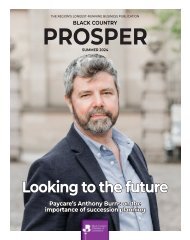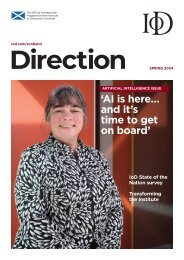IoD Scotland Autumn 2021
Institute of Directors Scotland, business magazine, directors
Institute of Directors Scotland, business magazine, directors
Create successful ePaper yourself
Turn your PDF publications into a flip-book with our unique Google optimized e-Paper software.
Technical briefing: Tech matters<br />
Beating<br />
burnout:<br />
Why it’s vital you<br />
take time out<br />
Arthritis & repetitive strain<br />
From spending so much time<br />
on laptop/phone<br />
Bloating<br />
Due to digestive problems<br />
caused by stress<br />
Overweight<br />
Has a high risk of diabetes<br />
and heart disease due to not<br />
prioritising health and diet<br />
Headaches<br />
Caused by stress,<br />
excessive screen time<br />
and intense pressure<br />
Hunchback<br />
Tension in back<br />
and neck caused<br />
by stress. A<br />
constant feeling<br />
of being weighed<br />
down<br />
Coffee stained shirt<br />
Addicted to caffeine<br />
Four out of ten entrepreneurs are reported to have experienced a form<br />
of burnout in the last year, coinciding with a call to introduce a four-day<br />
working week for all landing on Scottish Government policymakers’ desks.<br />
Something’s got to give, says industry commentator Bill Magee.<br />
A survey conducted by<br />
UK business financial<br />
platform Tide, chaired<br />
by the University<br />
of Edinburgh<br />
mathematical<br />
science graduate<br />
and former London<br />
Stock Exchange Group chair Sir Donald<br />
Brydon, highlights how burnout is<br />
increasingly affecting entrepreneurs<br />
running their own businesses.<br />
Tide’s chief administrative officer,<br />
Liza Haskell, points out that while hard<br />
work is required to make a success of<br />
an enterprise, it should not come at the<br />
expense of one’s health.<br />
Long hours may appear productive<br />
“in the moment” but over the long-term,<br />
the side effects of burnout – fatigue,<br />
reduced performance, lack of motivation<br />
– are likely to hinder progress, both<br />
personally and of the business.<br />
As the study reported a 40 per cent<br />
entrepreneurial burnout rate, it was<br />
stressed how important it is to step back<br />
and reassess one’s current lifestyle: try<br />
putting in place boundaries to create<br />
work-life balance, take regular breaks,<br />
look after your physical and mental<br />
wellbeing and seek additional support, if<br />
required.<br />
Healthcare professional Lee Chambers<br />
was asked to visualise how burnout<br />
could negatively impact and shape<br />
entrepreneurial performance.<br />
The research report in full is located<br />
here.<br />
What is burnout?<br />
A life of constant hustling can lead to<br />
burnout, a very real phenomenon that<br />
can manifest itself in a variety of mental<br />
and physical ways that can have a vastly<br />
negative impact on the lives of hustling<br />
entrepreneurs.<br />
In 2019, the World Health Organisation<br />
recognised burnout as a new syndrome<br />
and described it as “a syndrome<br />
conceptualised as resulting from chronic<br />
workplace stress that has not been<br />
successfully managed”.<br />
Physical and mental symptoms of<br />
burnout include:<br />
n Feeling tense and weighed down<br />
n Increased stress and fatigue<br />
n High blood pressure<br />
n Risk of Diabetes and Heart Disease<br />
n Reduced workplace performance<br />
n Lack of purpose<br />
n Loss of physical and mental<br />
wellbeing<br />
n Becoming detached from friends<br />
and family<br />
n Loss of our own esteem and identity<br />
Who is at risk from burnout?<br />
Burnout can manifest itself in different<br />
forms, and certain occupations can<br />
increase your potential chance of being<br />
burnt out. It’s a very individual condition,<br />
with people presenting very differently.<br />
Those at higher risk of burnout are<br />
in positions that involve seeing trauma,<br />
having to detach from emotive work,<br />
have long hours, and that are regularly<br />
judged and assessed.<br />
Those who work in hospitals and<br />
veterinary surgeries, therapists and<br />
teachers, social workers and law<br />
enforcement are all at a higher risk due<br />
to the nature of their jobs.<br />
Entrepreneurs are increasingly at risk<br />
as overworking is glamourised, they are<br />
less likely to have colleagues to keep<br />
them accountable to balance or identify<br />
the signs, and ‘hustling’ is advertised<br />
as a prerequisite of being a successful<br />
entrepreneur.<br />
20 iod.com<br />
<strong>Autumn</strong> <strong>2021</strong>

















